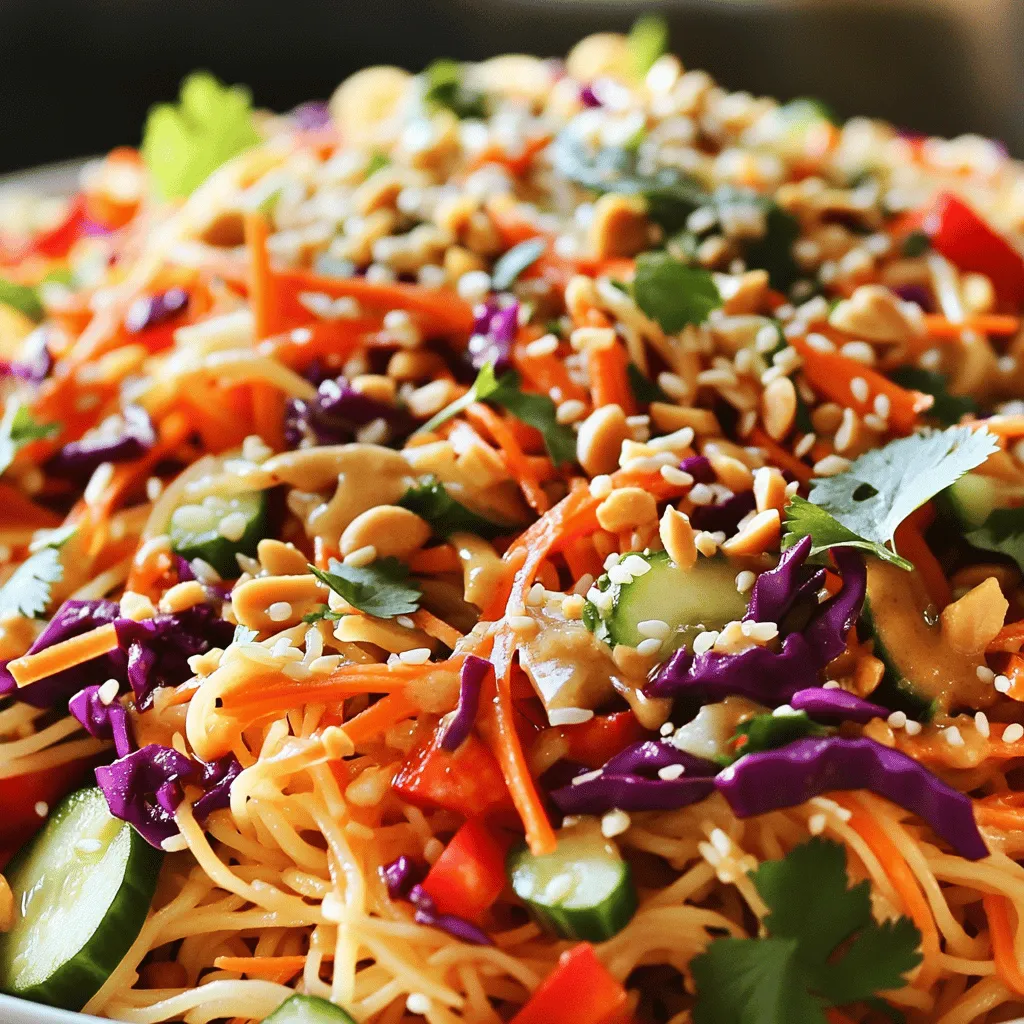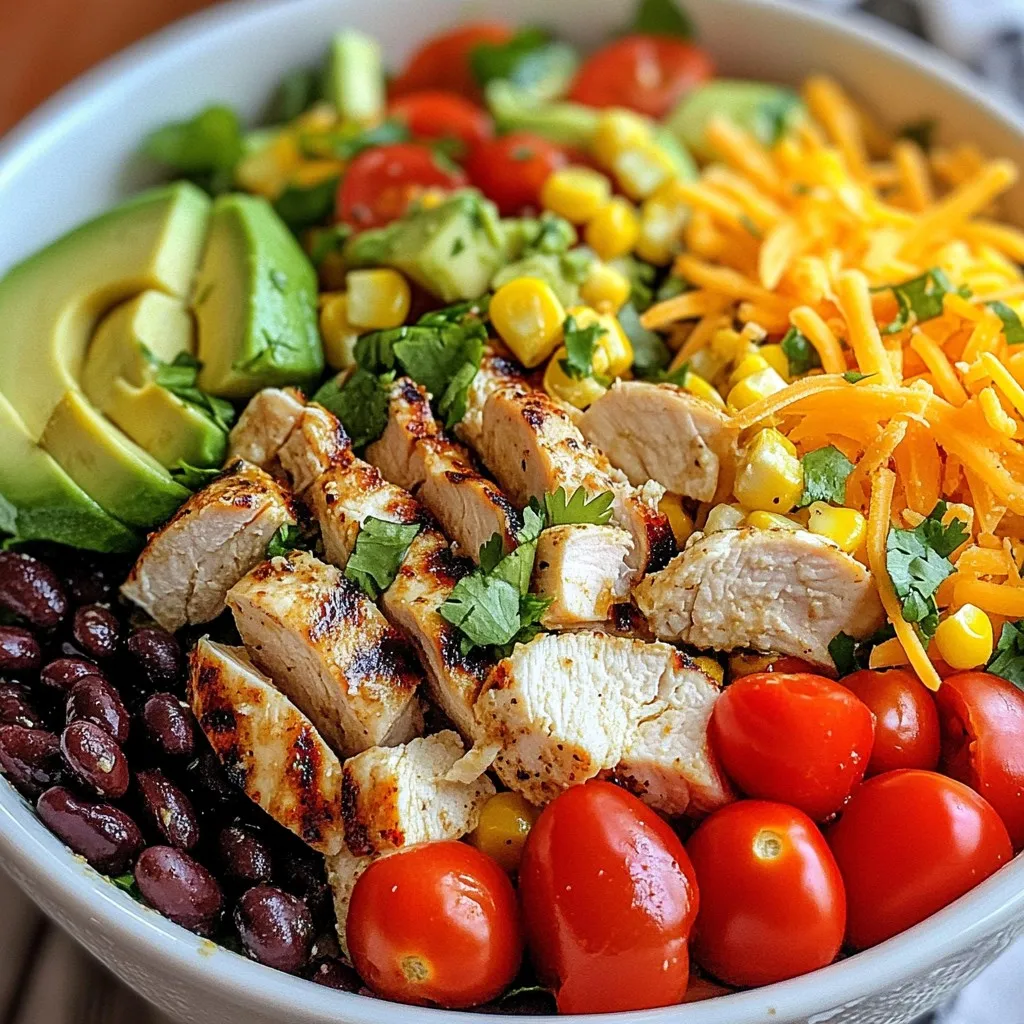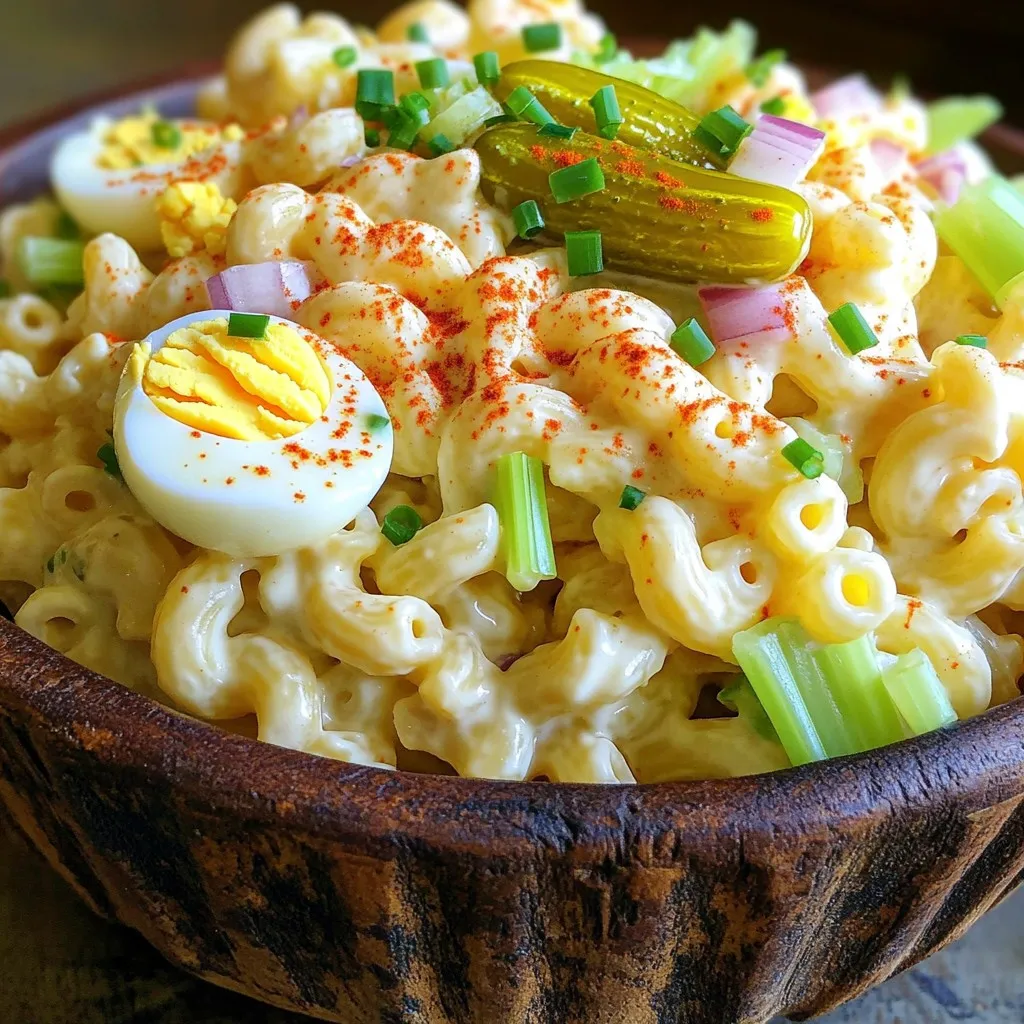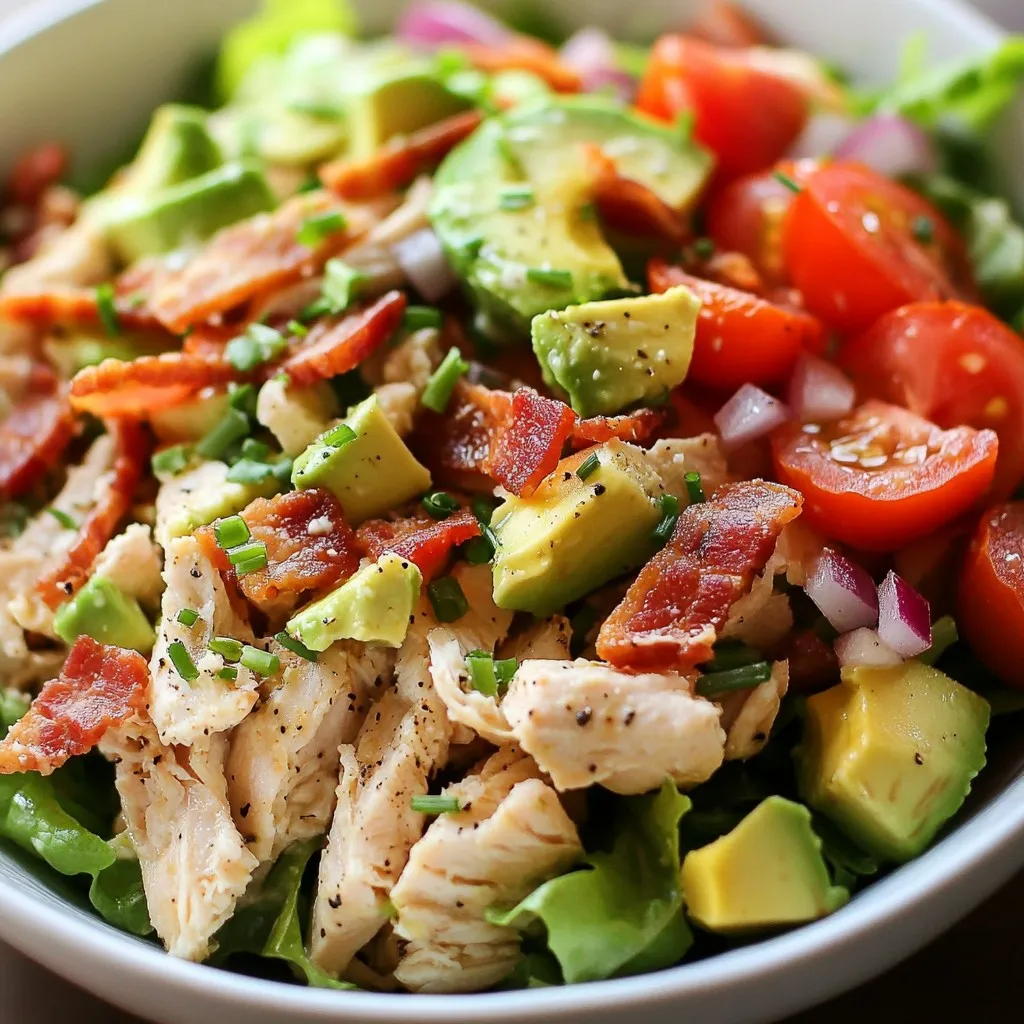Get ready to enjoy a burst of flavor with my Spicy Thai Peanut Noodle Salad! This delicious dish combines fresh ingredients with a vibrant peanut sauce that packs a punch. It’s perfect for anyone wanting a quick and healthy meal. Whether you’re feeding a crowd or just yourself, I’ll guide you through each step, sharing tips to customize it your way. Let’s dive into making this tasty salad!
Ingredients
Essential Ingredients
To make a tasty Spicy Thai Peanut Noodle Salad, gather these key ingredients:
– 8 oz rice noodles
– 1 cup shredded carrots
– 1 red bell pepper, thinly sliced
– 1 cucumber, julienned
– 1 cup red cabbage, finely shredded
– 1/4 cup fresh cilantro, chopped
– 1/4 cup scallions, finely chopped
– 1/2 cup creamy unsweetened peanut butter
– 2 tablespoons soy sauce
– 2 tablespoons freshly squeezed lime juice
– 1 tablespoon honey or maple syrup
– 1-2 cloves garlic, minced
– 1 tablespoon freshly grated ginger
– 1-2 teaspoons sriracha
– Salt and freshly ground black pepper to taste
– Crushed peanuts and sesame seeds for garnish
These ingredients create a balance of flavors and textures. The rice noodles serve as a base, while the veggies add crunch and color. Peanut butter gives the salad a creamy richness, and the sriracha brings the heat.
Optional Garnishes
You can enhance the dish with these garnishes:
– Crushed peanuts
– Sesame seeds
– A lime wedge
– Extra cilantro
These garnishes not only add flavor but also make the salad look beautiful. The lime wedge adds a pop of freshness, and the crushed peanuts give a nice crunch.
Recommended Substitutes
If you need alternatives, here are some options:
– Use soba noodles or vermicelli instead of rice noodles.
– Swap the red bell pepper with yellow or green peppers for a different taste.
– Try tahini instead of peanut butter for a nut-free option.
– Coconut aminos can replace soy sauce for a gluten-free version.
These substitutes allow you to customize the salad based on what you have. Feel free to mix and match to create a version that suits your taste!
Step-by-Step Instructions
Cooking the Noodles
First, fill a large pot with water and bring it to a boil. When the water bubbles, add 8 oz of rice noodles. Cook them according to the package instructions until they are al dente. This usually takes about 4-6 minutes. After cooking, drain the noodles in a colander. Rinse them under cold water. This stops the cooking and keeps the noodles from getting mushy. Set the cooled noodles aside in a large bowl.
Preparing the Dressing
In a separate medium bowl, mix the dressing. Start with 1/2 cup of creamy peanut butter. Then, add 2 tablespoons of soy sauce and the juice from one lime. Next, add 1 tablespoon of honey or maple syrup for sweetness. Include 1-2 cloves of minced garlic and 1 tablespoon of freshly grated ginger. For a spicy kick, add 1-2 teaspoons of sriracha. Whisk these ingredients until the mixture is smooth. If it’s too thick, add water a little at a time until it reaches the right consistency.
Mixing the Salad
Now, it’s time to bring it all together. To the bowl with the cooled noodles, add 1 cup of shredded carrots, 1 thinly sliced red bell pepper, 1 julienned cucumber, and 1 cup of finely shredded red cabbage. Toss in 1/4 cup of chopped cilantro and 1/4 cup of finely chopped scallions. Use tongs or your hands to mix everything gently. Make sure the noodles and veggies are evenly combined without breaking the noodles.
Next, drizzle your peanut dressing over the salad. Toss everything together again, ensuring that every bite is packed with flavor. Taste the salad and season it with salt and freshly ground black pepper to your liking. You can serve this salad chilled or at room temperature. For a beautiful finish, top it with crushed peanuts and sesame seeds. Enjoy!
Tips & Tricks
Achieving the Perfect Noodle Texture
To get the best noodle texture, cook the rice noodles until they are al dente. This means they should be firm but not hard. After cooking, drain the noodles and rinse them in cold water. This stops the cooking and keeps them from sticking. Toss them gently to avoid breaking. Keep them in a large bowl to mix with the veggies later.
Customizing the Spice Level
You can adjust the heat by changing the amount of sriracha. If you like it mild, start with one teaspoon. For more heat, add up to two teaspoons. Taste the dressing as you mix. You can always add more spice later. Remember, you can balance the heat with sweetness from honey or maple syrup.
Enhancing Flavor with Additional Ingredients
Feel free to boost the flavor with extra ingredients. Some great options include:
– Chopped peanuts for crunch
– Slices of fresh jalapeños for heat
– Avocado for creaminess
– Fresh herbs like mint or basil for freshness
These additions can make your salad even more exciting and delicious!
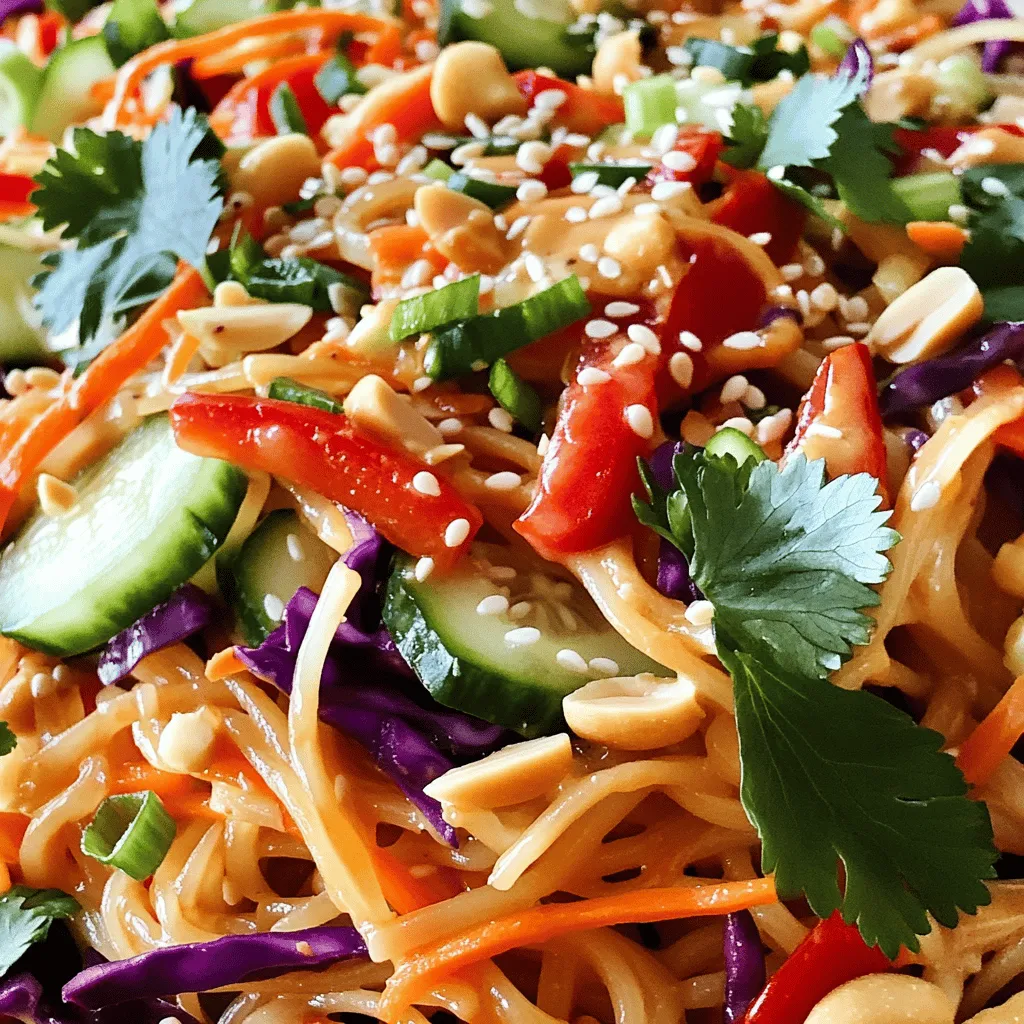
Variations
Vegetarian and Vegan Adaptations
You can easily make this salad vegetarian or vegan. Just skip the honey and use maple syrup instead. This sweetener works great in the dressing. You can mix in more veggies too. Add ingredients like bell peppers, broccoli, or snap peas. These add color and crunch.
Protein Add-ins (Tofu, Chicken, Shrimp)
Want to make it heartier? Add protein to the mix. Tofu is a fantastic choice for vegetarians. Just cube it and pan-fry it until golden. For meat lovers, grilled chicken adds a nice touch. Cook the chicken with some spices for extra flavor. Shrimp is another great option. Cook them quickly in a hot pan until they turn pink. Each protein gives the salad a different taste.
Alternative Sauces and Dressings
Not a fan of peanut sauce? No problem! You can use tahini for a nut-free option. It gives a creamy texture and rich flavor. A light soy dressing works too. Mix soy sauce, lime juice, and a touch of sesame oil. This adds a nice twist to your salad. You can even try a spicy chili sauce for extra heat.
Storage Info
Best Practices for Refrigeration
To keep your Spicy Thai Peanut Noodle Salad fresh, store it in an airtight container. Make sure the container is clean to avoid any bad flavors. Place the salad in the fridge right after serving. This way, it stays cool and tasty. If you plan to eat leftovers, try to keep the dressing separate. This helps prevent soggy noodles and veggies.
Reheating Instructions
Reheating this salad is not always needed, but if you prefer it warm, do so gently. Use a microwave and heat it in short bursts of 20 seconds. Stir it after each burst to ensure even warming. You can also toss it in a pan over low heat. Remember, heating too much can change the salad’s texture.
Shelf Life and Freezing Tips
This salad is best enjoyed fresh, but it can last in the fridge for up to three days. If you freeze it, the texture may change. I recommend eating it within one day if frozen. To freeze, place the salad in a freezer-safe bag. Remove as much air as possible before sealing. When ready to eat, thaw it in the fridge overnight.
FAQs
What type of noodles are best for this salad?
I recommend rice noodles for this salad. They have a light and chewy texture. You can find them at most grocery stores. They cook quickly, making them perfect for busy days. Avoid using egg noodles as they change the dish’s flavor and texture.
Can I make the peanut sauce ahead of time?
Yes, you can make the peanut sauce ahead. Just store it in a jar or airtight container. Keep it in the fridge for up to a week. When you’re ready to use it, just stir it well. If it’s thickened, add a little water to loosen it up.
How do I make this dish gluten-free?
To make this salad gluten-free, use gluten-free soy sauce. You can find this in most stores. Check the labels to be sure. Also, rice noodles are naturally gluten-free, so you’re already set on that front.
Is it possible to add more vegetables?
Absolutely! You can add more veggies to boost nutrition and flavor. Try snap peas, bell peppers, or even broccoli. Just chop them into thin pieces. This will help them mix well with the noodles and dressing. Mix and match based on your favorite veggies.
This blog post covered how to create a delicious noodle salad. You learned what ingredients to use, from essential ones to optional garnishes. We provided step-by-step instructions for cooking and mixing. Plus, we shared tips for texture and flavor. Explore variations to suit your taste, whether vegetarian or with protein. Finally, I gave storage advice for freshness. Now, you can enjoy this healthy and tasty dish anytime. Happy cooking!

